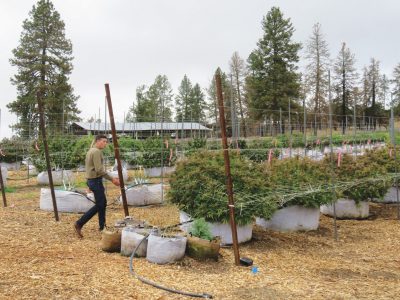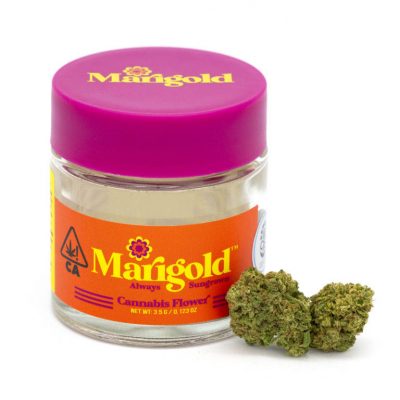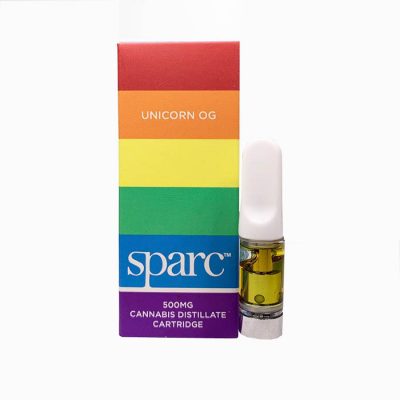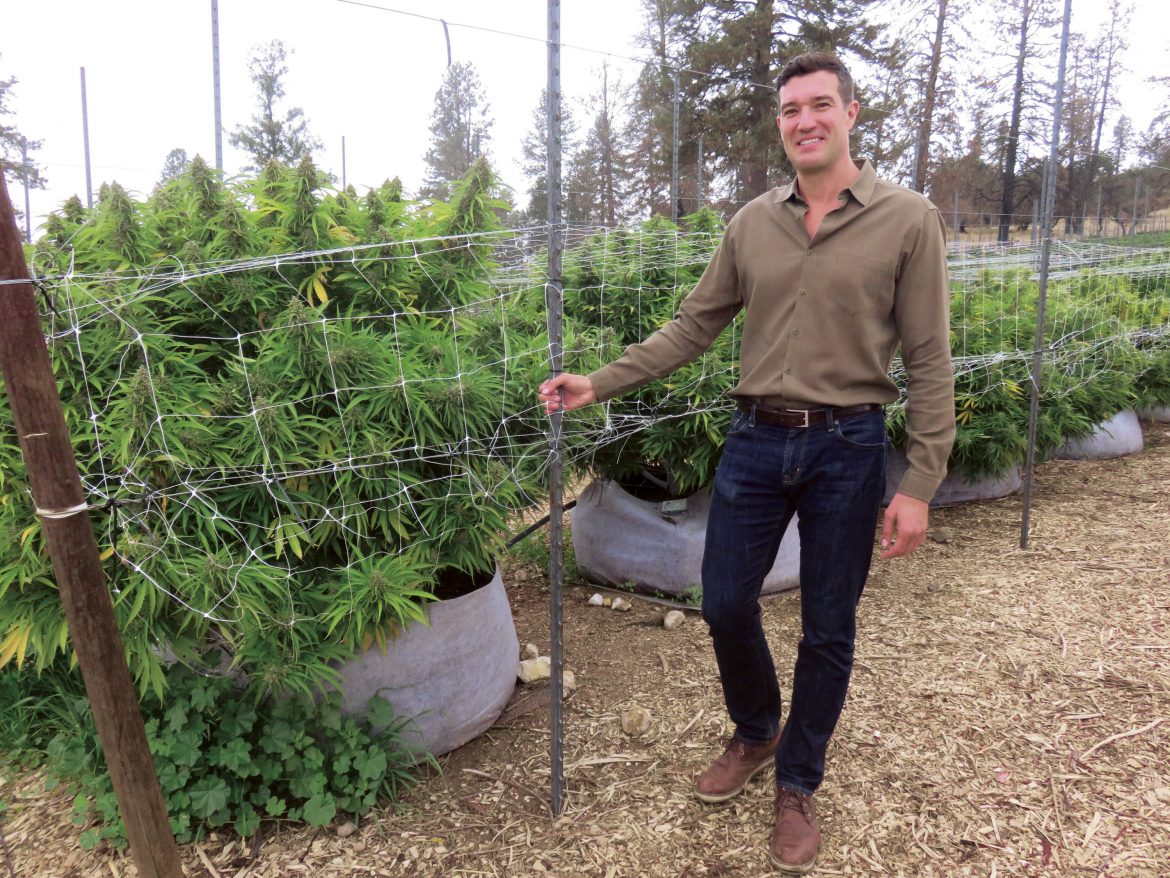Marijuana plants are finicky. They need the perfect amount of sun and water, plus mild temperatures. Their soil must be balanced with the right nutrients, and there shouldn’t be too much humidity. Then, even once the plants grow several feet tall, they may turn out to be male, which is helpful for plant reproduction, but not for bearing buds rich in THC and CBD cannabinoids. This sort of knowledge is the foundation of Erich Pearson’s work. Pearson, 43, is founder and CEO of SPARC, a cannabis cultivator, manufacturer, and retailer with a 400-acre farm, and five stores in San Francisco and Sonoma County.
Along with cannabis, Pearson has cultivated his own expertise since he arrived in Northern California from Indiana in 1998. The state had legalized medical marijuana two years prior, and the nascent industry presented plenty of opportunity to those ready to actually build it. So Pearson dove in headlong, growing his own plants first in grow houses, then on farmland in Mendocino. He soaked up knowledge like a botanist, but always with an entrepreneurial eye.

Photo by Stepan Kapl
After more than a decade of education and supplying cannabis to other dispensaries, Pearson opened the San Francisco Patient and Resource Center, or SPARC. The flagship SOMA dispensary stood out immediately for its customer service, branding, and design. Along with national headlines, the store earned an American Institute of Architects interior-design award for Sand Studios’s modern, sophisticated aesthetics. Its Mission Street exterior stands out too for its translucent glass and steel façade, inspired by the Castro’s Twin Peaks Tavern, among the first gay bars ever to open with clear windows.
Reimagining the retail experience was a step in Pearson’s mission to help legitimize and destigmatize cannabis. Almost instantly he saw perceptions shift as customers came to appreciate conversations with SPARC staff and understand more about the variety of strains, products, and forms of marijuana, from flower to resin to vapor and beyond.
As the SPARC flagship found its footing, Pearson continued to build the brand and roll out to other neighborhoods and towns. He also started a quest to address California’s complex cannabis laws, made even more challenging by layers of county and city regulations, plus the 2016 legalization of recreational marijuana. The state’s cannabis-sales tax code and licensing systems are notoriously difficult to navigate, allowing the illicit weed market to thrive while business owners struggle.


Photo by Oleksandrum
So Pearson expanded his work to the legislative realm, joining the newly formed National Cannabis Industry Association board in 2010 to help shift policy, advocate for better cannabis accessibility, and streamline regulatory processes. He served on San Francisco’s Medical Marijuana Advisory Group, and on local task forces to help make sense of permitting and business taxes, and address law-enforcement priorities around marijuana offenses.
More recently, Pearson joined with fellow entrepreneurs to form the Cannabis Business Association of Sonoma County. Over its first three years, CBAS has devoted most of its efforts to revising what Pearson calls “unworkable” ordinances within the county that’s world-famous for grape growing and winemaking. He says that since the first recreational laws were written 2016, there’s been an unwillingness by local officials to readdress a key ordinance around cannabis cultivation.
“By organizing our farmers, we finally convinced our government to take a second look at the ordinance,” says Pearson. “So we’re very excited about loosening the restrictive nature of the ordinance that keeps farmers from farming in Sonoma County.” Even as the COVID-19 pandemic locked down society starting in March 2020, Pearson said CBAS met online and continued conversations with county supervisors. With the help of the county administrator, the association expects supervisors to vote on a substantially overhauled ordinance in August 2020. It accounts for state laws and changing economics in what is now a struggling cannabis industry, which is hindered by an outdated tax scheme and outsold by black-market pot dealers.
The ordinance also makes the key change of shifting the permitting process to the local agricultural department, “making the permitting of these farms substantially easier,” he says. “That will allow for farmers to apply for on-site sales on their farms, much like a wine experience.”
You could say Pearson has selfish reasons for reworking Sonoma’s cannabis regulations. The man comes across like a farmer in CEO clothes. “I came out here to grow marijuana,” he says. In the 22 years since, he’s realized that goal and is an established cultivator, having spent many years selling flower and other products to dispensaries without a real brand of his own. Now that his five stores are humming along with the help of SPARC President and COO Sean Kelley, Pearson has been able to focus on his biodynamic farm in Glen Ellen.


Erich Pearson at the SPARC farm (photo by Kelsy Chauvin)
A rare property in Sonoma Valley that’s never grown grapes, the SPARC farm is Pearson’s happy place. Cattle graze around a fenced-in field that’s dotted with hundreds of giant cannabis bushes, each contained in enormous grow bags for better soil management. The farm was devastated by the 2017 wildfires, but has recovered, and is now Pearson’s part-time home thanks to a shiny Airstream camper.
Like any good farmer, Pearson keeps learning how to improve cultivation. He collaborates with cannabis breeders to curate prime phenotypes, improve strains, and maximize his crops. With plans to build a plant nursery and greenhouse on site, he says he’s excited to have proper infrastructure to be “a first-class company that’s growing cannabis.”
SPARC-branded flower and goods like tinctures, capsules, and vape cartridges are a cornerstone of the business. The company even makes its own rainbow-clad Pride cartridges, which sends $1 to San Francisco’s GLBT Historical Society for each one sold. They also make other monthly themed vapes, including ones for the Folsom Street Fair and breast-cancer awareness.
His company now has a leg up in e-commerce too, having spent eight months developing a proprietary online-ordering and delivery/pickup software that launched with perfect shelter-in-place timing in early 2020, when dispensaries were deemed essential businesses. Pearson says the software streamlines the ordering process, and keeps the online product menu updated by tying directly into inventory and point-of-sale systems, “so it’s constantly accurate,” he says.


Photo Courtesy of SPARC
“We now have technology that sounds fairly simple, but it takes a while to get set up, and allows us to serve consumers directly, very quickly, and seamlessly without error,” says Pearson. “With online users, it needs to be seamless. If they get an error notice, or their credit card numbers don’t go through, or the order is late, we oftentimes don’t ever get them back. There are not a lot of dispensaries out there that have this working nicely.”
The delivery option is successfully running out of SPARC’s SOMA and Santa Rosa locations, which dispatch drivers to broad areas. Meanwhile, its stores in Lower Haight, the Castro/Mission, and Sebastopol offer advance ordering for express in-store pickups.
Retail management and customer service are other elements that SPARC is known for, and the software addition has helped the company expand to serve other dispensaries in a distinct way.
“We’re actually managing some stores from other businesses, because we’ve gotten really good at understanding the customer and the technology associated [dispensaries],” he says. “We offer the business structure, the point-of-sale system, the website, the branding, the vertical products that we bring…but keep the same people involved. We don’t own the store, but we’ll brand the store, almost like a franchise model, but not quite, because we’re actually the operator.”
“So it gives us opportunities,” says Pearson. “It allows us to deliver our menu and our products with a joint venture out of another company’s retail store. Use Sacramento for example: You may have a dispensary with a particular brand, and they may have a lot of foot traffic, and they want their brand, and to maintain their unique connection to the community. And they don’t want to be called SPARC. But they don’t have delivery. And we can say, ‘Let us add delivery here, you’re going to add a few drivers, we’ll give you standard operating procedures, and the technology is here. And your drivers just take that and deliver orders.’ We can have a whole presence in that town without even a storefront.”


Photo Courtesy of SPARC
The future of cannabis seems unstoppable, though Pearson says that the industry could stand to be more inclusive of people of color and LGBTQ folks across the board, be it farming, manufacturing, sales, finance, or governmental.
As for sales trends, Pearson and his partner Kelley have seen a surge of seniors and retirees taking advantage of both THC (pot’s psychoactive “high” component) and CBD (the medicinal element, that can help alleviate pain, anxiety, and depression), often in pill or edible forms. The recent “vape crisis” stoked health concerns over untested cartridges and extraction methods, leading to more old-fashioned flower and pre-rolled joint sales.
But even as he talks business, Pearson often returns to the farming frame of mind.
“I’ve got a vision with our farm in Glen Ellen,” he says. “I want this place to be incredible, where someone can come in like they would a winery, and enjoy cannabis, and hang out on the lake, maybe listen to some music, and take a tour and learn about biodynamic farming, and the animals on the farm. We hope to have public access to our property, where folks can come and experience the cannabis plant and the nature that we produce it in. I’m pretty laser focused on that.”
______________________________


